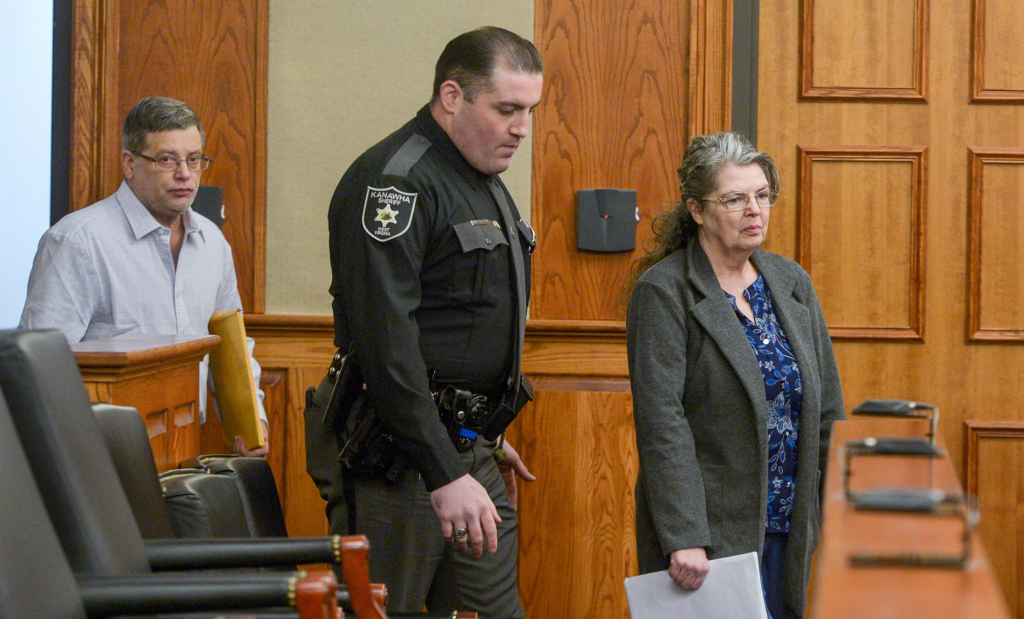The harrowing case of Jeanne Kay Whitefeather and Donald Ray Lantz has shed light on a disturbing story of neglect, abuse, and forced labor. The couple, a white pair from West Virginia, was recently convicted of charges ranging from child neglect to human trafficking after a jury heard heart-wrenching testimonies from the children they had adopted.
The trial exposed a pattern of behavior that prosecutors argued was rooted in control and exploitation, reducing their five adopted Black children to a state of servitude.
The Alarming Circumstances of Abuse
Jeanne Kay Whitefeather and Donald Ray Lantz adopted five Black siblings, taking them from their home state of Minnesota and relocating them to Washington in 2018 before settling on a farm in West Virginia in May 2023.
At the time of their arrival in West Virginia, the children ranged in age from 5 to 16. What began as a seemingly noble act of adoption soon turned into a nightmare for the children.
Neighbors became suspicious of the couple’s behavior and reported seeing unsettling events on their property. In one particularly alarming incident, neighbors witnessed Lantz locking two of the children—a teenage boy and girl—in a shed and leaving the property.
When authorities intervened, they had to use a crowbar to release the children. Inside the shed, the living conditions were appalling, with no proper sleeping arrangements or sanitary facilities. A key to the shed was later found hidden, suggesting the children were not free to come and go as Whitefeather claimed.
Inside the main house, a similarly grim scene awaited. A nine-year-old girl was found crying in a loft that lacked safety measures, while another child was discovered in a filthy state with sores on his feet and no shoes.
Read : Chak Hao Rice: The Black Jewel of Manipur Giving Proud to Whole India
It was clear that the children had been subjected to long-term neglect, both physically and emotionally. Following the intervention, the children were placed in the care of Child Protective Services.
Testimonies Reveal Horrifying Details
The trial revealed further details about the treatment the children endured under Whitefeather and Lantz. The eldest daughter, now 18, bravely testified, recounting the hardships they faced. The children were subjected to harsh physical labor, often forced to perform arduous chores around the property.
Tasks included lifting heavy objects and even digging with their bare hands. The eldest daughter described how these conditions were particularly severe when the family lived in Washington.
The children’s basic needs were barely met. They were given peanut butter sandwiches as their primary source of food, often leftovers from previous meals. Their sleeping arrangements were just as dire—most were forced to sleep on the floor.

Hygiene was neglected, with the children bathing infrequently and using buckets as toilets in their shared spaces. The eldest daughter and her brother were forced to share a room and a bucket for their bathroom needs, holding up a sheet for privacy.
The daughter also testified about the emotional abuse they endured. According to her, Whitefeather frequently cursed at them and used racist slurs. She recounted that Whitefeather refused to eat from the same plates as the children, calling them “dirty.” These actions not only demonstrated a lack of care but also a deep-seated prejudice that permeated the household.
During the trial, the prosecution entered racist text messages as evidence, allegedly sent by Whitefeather. Although she denied writing them, the content painted a troubling picture of the household dynamics. Prosecutors argued that the couple’s actions went far beyond poor parenting and were motivated by a desire to control and dehumanize the children.
The Legal Battle and Its Implications
The legal proceedings against Whitefeather and Lantz were extensive, with the jury deliberating for eight hours before delivering their verdict.
Whitefeather was convicted of all 19 counts against her, including forced labor, civil rights violations, human trafficking, and child neglect. Lantz was found guilty on 12 of 16 counts, including similar charges, though he was acquitted of four civil rights violations.
The couple’s defense attorneys argued that the couple had been overwhelmed by the challenges of raising children who had experienced trauma and abuse in their biological home.
They claimed that the couple’s parenting decisions, while flawed, were not motivated by malice. Whitefeather’s attorney described the shed as a “teenager hangout,” asserting that the children had access to a key and could leave at will. However, testimonies and evidence presented during the trial contradicted these claims.
The defense also attempted to shift blame onto the state’s child welfare system, accusing it of failing to provide adequate support. Lantz’s attorney argued that the state had “dropped the ball” when the couple sought help for the children’s mental health issues.
However, prosecutors countered that the couple had not made sufficient efforts to seek medical or psychological assistance for the children, despite living near a behavioral health clinic.

A forensic psychologist testified that the couple’s treatment of the children had exacerbated their mental health conditions. The eldest boy, who had been involved in a physical altercation with Whitefeather in 2022, is now receiving full-time care in a psychiatric facility. The psychologist’s testimony highlighted the long-term impact of the couple’s actions on the children’s well-being.
Prosecutors emphasized that the couple’s treatment of the children was not about teaching responsibility but rather about exerting control. Assistant Prosecutor Chris Krivonyak stated, “These kids weren’t there to be raised as children but served another purpose entirely. The whole point of treating them this way is they become less than human. They become more like machines.”
The trial’s outcome serves as a stark reminder of the systemic issues that allow such cases to occur. While the couple has been held accountable for their actions, the case also raises questions about the oversight and support provided by child welfare agencies. The children, now in the care of protective services, face a long road to recovery as they work to heal from the trauma inflicted upon them.
The conviction of Whitefeather and Lantz marks a significant step in seeking justice for the children. However, it also underscores the need for vigilance and systemic reform to prevent similar cases in the future.
The community’s role in reporting suspicions and the authorities’ swift action were crucial in bringing this case to light. Moving forward, it is essential to ensure that adopted children, particularly those from marginalized backgrounds, are protected and given the opportunity to thrive in a safe and nurturing environment.

